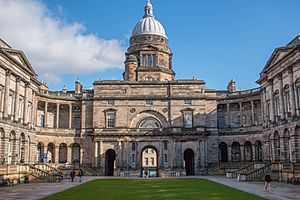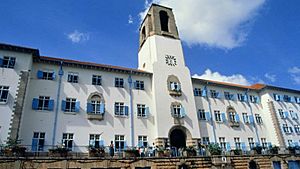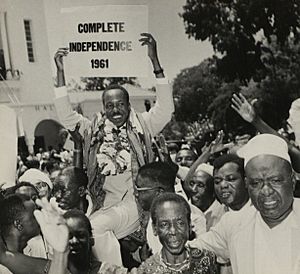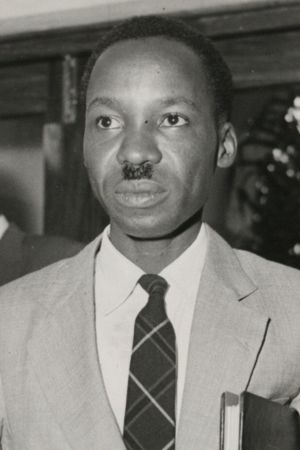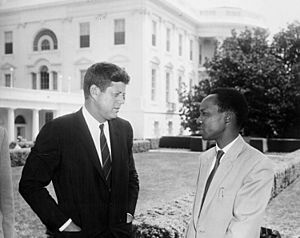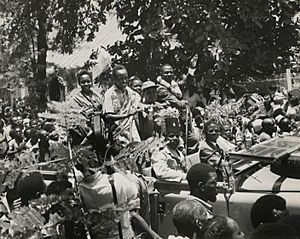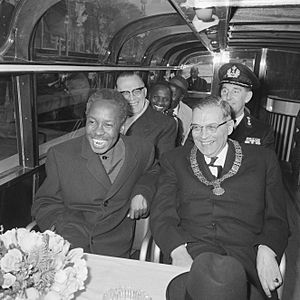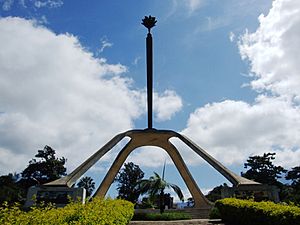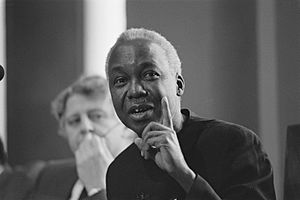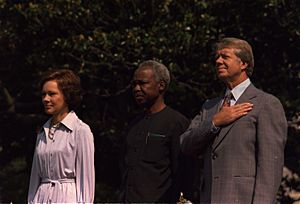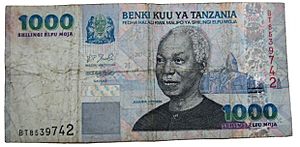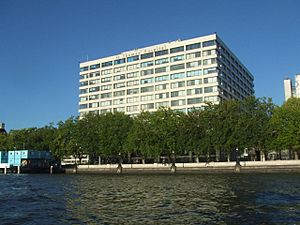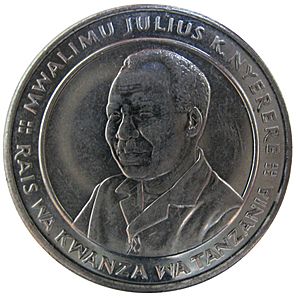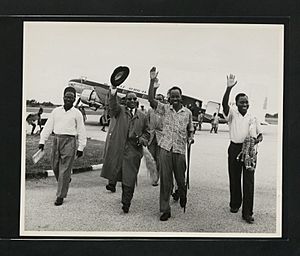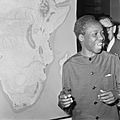Julius Nyerere facts for kids
Quick facts for kids
Mwalimu
Julius Nyerere
|
|
|---|---|
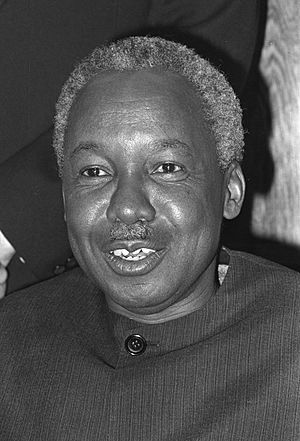
Nyerere in 1975
|
|
| 1st President of Tanzania | |
| In office 29 October 1964 – 5 November 1985 |
|
| Prime Minister |
|
| Vice President |
|
| Preceded by |
|
| Succeeded by | Ali Hassan Mwinyi |
| President of the United Republic of Tanganyika and Zanzibar | |
| In office 26 April 1964 – 29 October 1964 |
|
| Vice President |
|
| President of Tanganyika | |
| In office 9 December 1962 – 26 April 1964 |
|
| Prime Minister | Rashidi Kawawa |
| Prime Minister of Tanganyika | |
| In office 1 May 1961 – 22 January 1962 |
|
| Monarch | Elizabeth II |
| Preceded by | Himself (as Chief Minister) |
| Succeeded by | Rashidi Kawawa |
| Chief Minister of Tanganyika | |
| In office 2 September 1960 – 1 May 1961 |
|
| Monarch | Elizabeth II |
| Governor | Sir Richard Turnbull |
| Preceded by | Position established |
| Succeeded by | Himself (as Prime Minister) |
| Personal details | |
| Born |
Kambarage Nyerere
13 April 1922 Butiama, Mara Region, Tanganyika Territory |
| Died | 14 October 1999 (aged 77) London, England |
| Resting place | Butiama, Mara Region, Tanzania |
| Nationality | Tanzanian |
| Political party |
|
| Spouse |
Maria Nyerere
(m. 1953) |
| Children |
8
Andrew Burito Anna Watiku Anselm Magige John Guido (1957–2015) Charles Makongoro (b. 1959) Godfrey Madaraka Rosemary Nyerere (1961–2021) Pauleta Nyabanane |
| Alma mater |
|
| Profession | Teacher |
| Awards |
|
Julius Kambarage Nyerere (Swahili pronunciation: [ˈdʒuːlius kɑmbɑˈɾɑgɛ ɲɛˈɾɛɾɛ]; 13 April 1922 – 14 October 1999) was a Tanzanian anti-colonial activist, politician, and political theorist. He governed Tanganyika as prime minister from 1961 to 1962 and then as president from 1962 to 1964, after which he led its successor state, Tanzania, as president from 1964 to 1985. He was a founding member and chair of the Tanganyika African National Union (TANU) party, and of its successor Chama Cha Mapinduzi, from 1954 to 1990. Ideologically an African nationalist and African socialist, he promoted a political philosophy known as Ujamaa.
He is held in deep respect within Tanzania, where he is often referred to by the Swahili honorific Mwalimu ("teacher") and described as the "Father of the Nation."
Contents
Early life and education
Julius Kambarage Nyerere was born on 13 April 1922 in Mwitongo, an area of the village of Butiama in Tanganyika's Mara Region. He was one of 25 surviving children of Nyerere Burito, the chief of the Zanaki people. Burito had 22 wives, of whom Julius' mother, Mugaya Nyang'ombe, was the fifth. She had been born in 1892 and had married the chief in 1907. Mugaya bore Burito four sons and four daughters, of which Nyerere was the second child; two of his siblings died in infancy.
At birth, Nyerere was given the personal name "Mugendi" ("Walker" in Zanaki) but this was soon changed to "Kambarage", the name of a female rain spirit, at the advice of a omugabhu diviner. Nyerere was raised into the polytheistic belief system of the Zanaki, and lived at his mother's house, assisting in the farming of the millet, maize and cassava. With other local boys he also took part in the herding of goats and cattle. As the son of a chief he was exposed to African-administered power and authority, and living in the compound gave him an appreciation for communal living that would influence his later political ideas.
The British colonial administration encouraged the education of chiefs' sons, believing that this would help to perpetuate the chieftain system and prevent the development of a separate educated indigenous elite who might challenge colonial governance. At his father's prompting, Nyerere began his education at the Native Administration School in Mwisenge, Musoma in February 1934, about 35 km from his home. This placed him in a privileged position; most of his contemporaries at Butiama could not afford a primary education. His education was in Swahili, a language he had to learn while there. Nyerere excelled at the school, and after six months his exam results were such that he was allowed to skip a grade. He avoided sporting activities and preferred to read in his dormitory during free time.
His elementary schooling ended in 1936; his final exam results were the highest of any pupil in the Lake Province and Western Province region.
His academic excellence allowed him to gain a government scholarship to attend the elite Tabora Government School, a secondary school in Tabora. There, he again avoided sporting activities but helped to set up a Boy Scout's brigade after reading Scouting for Boys. Fellow pupils later remembered him as being ambitious and competitive, eager to come top of the class in examinations. He used books in the school library to advance his knowledge of the English language to a high standard. He was heavily involved in the school's debating society, and teachers recommended him as head prefect, but this was vetoed by the headmaster, who described Nyerere as being "too kind" for the position.
In keeping with Zanaki custom, Nyerere entered into an arranged marriage with a girl named Magori Watiha, who was then only three or four years old but had been selected for him by his father. At the time they continued to live apart. In March 1942, during Nyerere's final year at Tabora, his father died; the school refused his request to return home for the funeral. Nyerere's brother, Edward Wanzagi Nyerere, was appointed as their father's successor. Nyerere then decided to be baptised as a Roman Catholic; at his baptism, he took on the name "Julius", although later stated that it was "silly" that Catholics should "take a name other than a tribal name" on baptism.
After completing his schooling, he studied at Makerere College in Uganda and then Edinburgh University in Scotland. He was one of only two black students from the British East African territories studying in Scotland.
Career
In 1952 he returned to Tanganyika, married Maria Gabriel, and worked as a school teacher. In 1954, he helped form TANU, through which he campaigned for Tanganyikan independence from the British Empire. Influenced by the Indian independence leader Mahatma Gandhi, Nyerere preached non-violent protest to achieve this aim. Elected to the Legislative Council in the 1958–1959 elections, Nyerere then led TANU to victory at the 1960 general election, becoming Prime Minister. Negotiations with the British authorities resulted in Tanganyikan independence in 1961. In 1962, Tanganyika became a republic, with Nyerere elected as its first president. His administration pursued decolonisation and the "Africanisation" of the civil service while promoting unity between indigenous Africans and the country's Asian and European minorities. He encouraged the formation of a one-party state and unsuccessfully pursued the Pan-Africanist formation of an East African Federation with Uganda and Kenya. A 1963 mutiny within the army was suppressed with British assistance.
Following the Zanzibar Revolution of 1964, the island of Zanzibar was unified with Tanganyika to form Tanzania. After this, Nyerere placed a growing emphasis on national self-reliance and socialism. Although his socialism differed from that promoted by Marxism–Leninism, Tanzania developed close links with Mao Zedong's China. In 1967, Nyerere issued the Arusha Declaration which outlined his vision of ujamaa. Banks and other major industries and companies were nationalised; education and healthcare were significantly expanded. Renewed emphasis was placed on agricultural development through the formation of communal farms, although these reforms hampered food production and left areas dependent on food aid. His government provided training and aid to anti-colonialist groups fighting white-minority rule throughout southern Africa and oversaw Tanzania's 1978–1979 war with Uganda which resulted in the overthrow of Ugandan President Idi Amin. In 1985, Nyerere stood down and was succeeded by Ali Hassan Mwinyi, who reversed many of Nyerere's policies. He remained chair of Chama Cha Mapinduzi until 1990, supporting a transition to a multi-party system, and later served as mediator in attempts to end the Burundian Civil War. The negotiations would continue until Nyerere's death, at which his role was taken on by former President of South Africa Nelson Mandela. In 1997, he made his final visit to Edinburgh, delivering the Lothian European Lecture and teaching seminars at the university's Centre of African Studies. The government and army contributed funds to build Nyerere a house in his home village; it was finished in 1999, although he only spent two weeks there prior to his death.
Death
He died on 14 October 1999, with his wife and six of his children at his bedside. Benjamin Mkapa, Tanzanian president at the time, announced Nyerere's death on national television, and also proclaimed a 30-day mourning period. Nyerere was honoured by Tanzanian state radio playing funeral music while video footage of him were broadcast on television. A requiem mass was then held at Westminster Cathedral on 16 October. His body was then flown back to Tanzania, where it was carried past crowds in Dar es Salaam and taken to his coastal home. There, another requiem mass was held at St Joseph's Cathedral. A funeral was then held at the National Stadium, in which hundreds passed by the body as it lay in state. Finally, the body was flown to Butiama and buried.
Ujamaa
Nyerere's ideology, a form of African socialism, is known as Ujamaa. Many of Nyerere's political beliefs were developed while he was studying in Edinburgh; he noted that he "evolved the whole of my political philosophy while I was there". In the city, he was influenced by texts produced within the traditions of classical liberalism and Fabian socialism, as well as by his reading of Adam Smith and John Stuart Mill, both of whom he had studied as a student. For much of his life he was a prolific writer and speaker, leaving much material behind espousing his ideology. The political economist Issa G. Shivji noted that although Nyerere was "a great man of principle" but that when in power, "at times pragmatism, even Machiavellism, overshadowed his avowed principles". As a result, Shivji argued, Nyerere exhibited "a great ability and talent to rationalise his political actions with an astute exposition of principles".
Anti-colonialism and Pan-Africanism
Nyerere was an African nationalist. He despised colonialism, and felt duty bound to oppose the colonial state in Tanganyika.
Nyerere was also a Pan-Africanist.
Democracy and the one-party state
Nyerere emphasised the idea of democracy as a principle. He described democracy as "government by the people... Ideally, it is a form of government whereby the people – all the people – settle their affairs through free discussion." He absorbed the values of liberal democracy but focused attention on how to "Africanize" democracy. He emphasized that post-colonial African states were in a very different situation to Western countries and thus required a different governance structure; specifically, he favoured a representative democratic system within a one-party state. He opposed the formation of different parties and other political organisations with differing objectives in Tanzania, deeming them disruptive to his idea of the harmonious society and fearing their ability to further destabilise the fragile state.
He criticised the de facto two-party system he had observed in Britain. For Nyerere, it was the preservation of political and civil liberties, rather than the presence of multiple parties, that ensured democracy; he believed that freedom of speech was possible in a one-party state. However, his opposition to the formation of competing political groups led critics to argue that there were anti-democratic implications to his thought.
Nyerere was keen to associate himself with the idea of freedom, titling his three major compilations of speeches and writings Freedom and Unity, Freedom and Socialism, and Freedom and Development. His conception of freedom was strongly influenced by the ideas of German philosopher Immanuel Kant. Like Kant, Nyerere believed that the purpose of the state was to promote liberty and the freedom of the individual.
African socialism
Nyerere was a socialist, with his views on socialism intertwined with his ideas on democracy. He promoted "African socialism". Nyerere saw socialism not as an alien idea to Africa but as something that reflected traditional African lifestyles. In his view, a "socialist attitude of mind" was already present in traditional African society. In his words from 1962, "We, in Africa, have no more need of being "converted" to socialism than we have of being "taught" democracy. Both are rooted in our past – in the traditional society which produced us." He presented the traditional African village—as well as the ancient Greek city state—as the model for the idealised society. In most of Africa, Nyerere said, "we have to begin our socialism from tribal communalism and a colonial legacy which did not build much capitalism".
He desired a society in which the interests of the individual and society were identical and thought this could be achieved because individuals ultimately wanted to promote the common good. He believed it important to balance the rights of the individual with their duty to society, expressing the view that Western countries placed too much of an emphasis on individual rights.
Nyerere remained dedicated to a belief in the rule of law. He stressed the need for hard work. Nyerere appealed to the idea of tradition when trying to convince Tanzanians of his ideas. He stated that Tanzania could only be developed "through the religion of socialism and self-reliance". He reiterated the ideas of freedom, equality, and unity as being central to his concept of African socialism.
Personality and personal life
Smith described Nyerere as "a slight, wiry man with a high forehead and a toothbrush moustache". He was described as an eloquent speaker, and a skilled debater, with Bjerk describing him as having "a scholar's mind". According to Molony, "articulated his sometimes complex ideas in a simple and logical style of speechwriting." Nyerere was a modest man who was shy regarding the personality cult that followers established around him. In rejecting the personality cult, he for instance rejected ideas that statues be built to him. In a 1963 memorandum, he called on colleagues to help him in "stamping out the disease of pomposity" in Tanzanian society. As President, he for instance did not like to be referred to as either "Your Excellency" or "Dr Nyerere". Most staff members referred to him as "Mzee", a Swahili word meaning "old man". Smith noted that Nyerere had a "respect for spartan living" and an "abhorrence of luxury"; in his later years he always travelled by economy class. Bjerk described to Nyerere as giving "meandering speeches spiced with barbed humor."
Assessing his early life, Molony described Nyerere as "down-to-earth, principled, and had a strong sense of fairness. He was modest and unpretentious. In contrast to a good number of his contemporaries at Tabora Boys, he was neither arrogant nor conceited." In focusing heavily on his studies, some regarded him as "a touch precocious", or even as a swot or a bore; in addition, Molony noted, Nyerere could be "manipulative at times, increasingly shrewd with experience, and always tenacious". Bjerk noted that Nyerere "delighted in wry irony", and "wore his emotions on his sleeve. His joy, anger, and sadness often poured out into public view".
Huddleston recalled conversations with Nyerere as being "exciting and stimulating", with the Tanzanian leader focusing on world issues rather than talking about himself. In Huddleston's view, Nyerere was "a great human being who has always treasured his human-ness (his humanity if you like) more deeply than his office". For Huddleston, Nyerere displayed much humility, a trait that was "rare indeed" among politicians and statesmen. Molony noted that, in Edinburgh, Nyerere was "quiet and fairly unremarkable, and therefore forgettable", "an unobtrusive and quietly competitive young man who kept his ambitions to himself."
Nyerere's secretary, Joseph Namata, said that the leader "jokes about everything" and "can shout if he is angry". When planners suggested infrastructure developments for his home area, Nyerere rejected the proposals, not wanting to present the appearance of giving favours to it. Nyerere ensured that his parents' resting places were maintained. Smith referred to Nyerere as "a scholar at heart". In later life, Twining described Nyerere as "a very shrewd politician, an emotionalist... he is not greedy, not corrupt; I think he is a good man." Molony suggested that there was "a very shrewd side to his character", in that he was capable of playing to his audience by portraying himself as "the betrayed righteous figure, employing melodrama and even extortion to get what he wanted".
The style of suit that Nyerere wore was widely imitated in Tanzania, which led to it being known as a "Tanzanian suit". Many European and American observers believed it similar to a Mao suit and interpreted it as evidence for Nyerere's perceived desire for greater links with the Marxist–Leninist government in China. Nyerere objected to the tendency in Western countries to view Africa through the prism of Cold War politics. After the formation of Tanzania, Nyerere took to wearing a style of Zanzibaran hat called a kofia. In later life, he carried a small ebony stick known as a fimbo which served as a symbol of his authority.
Nyerere published widely over the course of his life. He wrote poetry, and translated William Shakespeare's plays Julius Caesar and The Merchant of Venice into Swahili, publishing these in 1961 and 1972 respectively. In later life, he—like many other Anglophone African statesmen—was known to be an avid listener of the BBC World Service broadcasts. According to Smith, Nyerere had "a great fondness for British character and eccentricity".
Raised as a practitioner of Zanaki traditional religion, Nyerere converted to Catholicism at the age of 20 and remained a practitioner throughout his life. Christianity strongly influenced Nyerere's life and his political beliefs. Nyerere described Christianity as "a revolutionary creed" but believed that its message had often been corrupted by churches. He liked to attend Mass in the early mornings, and while in Edinburgh enjoyed spending time sitting quietly in church. There is some evidence that while in Scotland, he considered ordination as a Catholic priest. He avoided Christian sectarianism and was friends with Christians of other denominations. Into his later life, he regularly attended Mass.
With his wife Maria Gabriel, Nyerere had seven children. When Nyerere was president, he insisted that his children go to state school and receive no special privileges. Two of his children suffered from mental illness. During the 1970s, Nyerere's relationship with his wife became strained and she moved to live with her sister, near to the Kenyan border, for a while. He had 26 grandchildren.
Cause for canonization
In January 2005, the Diocese of Musoma opened the cause for the canonization of Julius Nyerere, who had been a devout Catholic and a man of recognized integrity. On 13 May 2005 Pope Benedict XVI declared him a Servant of God. The postulator for Julius' cause was Dr. Waldery Hilgeman.
Images for kids
-
Nyerere meeting with visitors from the United Nations
See also
 In Spanish: Julius Nyerere para niños
In Spanish: Julius Nyerere para niños
- List of presidents of Tanganyika
- List of prime ministers of Tanzania
- List of awards and honours received by Julius Nyerere


